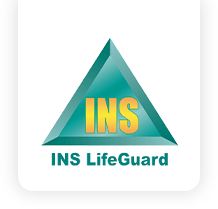INS LifeGuard
INS LifeGuard
International Enquiries
Clearing the Air: The Role of Air Purifiers in Asthma Management

Asthma is a condition that can affect anyone. In fact, it's estimated that over 300 million people worldwide suffer from asthma, regardless of age or background. Recognising this prevalence emphasises the need to address it through comprehensive management strategies.
Since asthma triggers can be found in various environments, such as homes, workplaces, and schools, prioritising air quality becomes important in reducing asthma triggers and improving respiratory health. In this blog, we’ll explore how air purifiers play a crucial role in creating a healthier environment for individuals with asthma.
What are Air Purifiers?
Air purifiers are devices designed to improve indoor air quality by removing contaminants, allergens, and pollutants from the air. They work by drawing air into the unit, passing it through various filters or purification mechanisms, and then releasing clean air back into the environment. By reducing the presence of dust, pollen, pet dander, and mould spores, air purifiers can potentially alleviate asthma symptoms and improve overall respiratory health.
Benefits of Air Purifiers in Managing Asthma
Air purifiers can offer several benefits to individuals with asthma:
Improved Air Quality
Studies show that most people spend 70% to 90% of their time indoors, which is why good indoor air quality helps to stay healthy and comfortable. Air purifiers achieve this by effectively removing pollutants and allergens from the air so that individuals can breathe clean and fresh air even inside their homes.
Decreased Asthma Attacks
Exposure to indoor pollutants can worsen asthma symptoms and increase their frequency and severity. With good indoor air quality, however, the presence of these triggers is minimised, leading to fewer asthma flare-ups and less severe symptoms overall.
Better Sleep Quality
Asthma symptoms often worsen at night, making it difficult for individuals to sleep and leaving them tired the next day. By reducing airborne allergens through air purifiers, individuals with asthma can enjoy cleaner air in their bedrooms, allowing them to breathe well and sleep more soundly through the night.
Enhanced Lung Function
Clean air free from pollutants, allergens, and irritants allows the lungs to function more efficiently. When the air is clean, the respiratory system is less likely to be irritated or inflamed, leading to improved breathing capacity and overall lung function of individuals with acute asthma.
Prevent Complications
While asthmatic individuals do not necessarily have weakened immune systems, they are exposed to higher risk of respiratory infections due to the chronic inflammation in their airways. Having a good indoor air quality prevents this by creating a healthy space where it’s safe and comfortable to breathe.
Impact on Daily Activities
Some individuals who suffer from severe asthma struggle to accomplish daily tasks due to constant coughing, wheezing, and shortness of breath. But by having good indoor air quality, they can breathe easier and perform their daily routines with less discomfort and interruption.
Long-term Health Benefits
Chronic exposure to indoor air pollutants can have long-term health effects, particularly for individuals with asthma. Using air purifiers can improve their overall health by reducing severity of their asthma symptoms, minimising the risk of respiratory infections, and promoting better lung function over time.
Peace of Mind
In general, individuals with asthma can relax knowing the air indoors is clean and safe. Even if no one is available to assist with cleaning, air purifiers can continuously filter out harmful allergens, allowing them to accomplish daily activities without worrying about the air they breathe at home.
Alternative Ways to Manage Asthma Symptoms
Aside from air purifiers, asthma can be effectively managed with the help of:
Breathing Techniques
Techniques such as pursed-lip breathing, deep breathing, and diaphragmatic breathing can help improve lung function and control breathing during an acute asthma attack. In addition, practicing relaxation techniques like guided imagery or progressive muscle relaxation alongside breathing exercises may further alleviate symptoms and reduce anxiety associated with an asthma flare-up.
Physical Activity
Engaging in regular physical activity, such as walking, swimming, or cycling, can help improve lung function and overall fitness, which can reduce the severity and frequency of asthma symptoms. Moreover, it can boost immune function which is beneficial in reducing the risk of respiratory infections that can trigger asthma.
Dietary Changes
Eating a balanced diet rich in fruits, veggies, and omega-3 fatty acids from fish, flaxseeds, and walnuts can ease inflammation and aid lung health. What's more, avoiding processed foods high in trans fats and sugars, and staying hydrated, can also help prevent asthma flare-ups.
Stress Management
Meditation techniques, progressive muscle relaxation, and mindfulness can all help reduce stress and anxiety, which are common triggers for asthma attacks. Incorporating these relaxation techniques can promote a sense of calm and well-being in individuals, which in turn positively impacts their respiratory health and improves their ability to cope with certain triggers.
Inhaled Corticosteroids
Inhaled corticosteroids are highly effective in asthma management as they reduce airway inflammation and swelling, which helps to alleviate symptoms like wheezing, coughing, and shortness of breath. By targeting the underlying inflammation in the airways, this asthma treatment not only provides relief from acute symptoms but also helps prevent asthma attacks while maintaining long-term asthma control.
Asthma Updates and Awareness
Staying informed about your triggers, symptoms, and management techniques, as promoted by organisations like the National Asthma Council Australia, is crucial for effective asthma management. By staying updated on evidence-based guidelines, treatments, and prevention strategies provided by the National Asthma Council Australia, individuals can proactively prevent asthma episodes.
Telehealth Services
Telehealth services, particularly INS LifeGuard's TeleHealth Services, enable individuals with asthma to receive 24/7 monitoring and support from qualified healthcare professionals. This benefits patients, carers, and providers by providing easy access to healthcare services. INS LifeGuard's Free TeleHealth Monitoring allows the user to record their vital signs using compatible monitoring devices and send them to a family member or a carer, while Professional TeleHealth Monitoring provides 24/7 access to a registered nurse for vital sign monitoring and intervention when needed. With INS LifeGuard's TeleHealth Services, asthma patients can check their respiratory health, monitor symptom trends, and effectively manage their asthma condition.
Personal Alarms
While personal alarms cannot cure asthma, they provide prompt assistance by sending alerts to an emergency department in the event of an asthma attack. INS LifeGuard’s personal alarms allow individuals with asthma to lead independent, active lives, with the assurance that help is available with a push of a button 24/7.
Takeaway
Asthma can significantly impact daily life, but with the help of air purifiers and the right management techniques, individuals can create a cleaner indoor environment and reduce their exposure to common asthma triggers.
In the event of an asthma attack, INS LifeGuard’s personal alarms offer 24/7 assistance. With a single press of a button, we will connect you with a highly qualified nurse in our Emergency Response Centre to give you advice and support when you need it most. To learn more about our products, call us at 1800 636 040 or visit our website.

About
INS LifeGuard is the only 24/7 nurse on-call personal and medical monitoring in Australia. We provide monitoring technology for both in the home and on the go and can also monitor other provider's equipment. Our services are suitable for anyone wanting support to stay independent such as the elderly, those with medical conditions and disabilities plus enhancing safety and security for lone workers.
Related Articles

-
Visit our website here
I hope you enjoy reading this blog post
INS LifeGuard is the only nurse on-call personal and medical alarm service in Australia. If you would like more information about INS LifeGuards solutions, visit our website here.
I hope you enjoy reading this blog post.
INS LifeGuard is the only nurse on-call personal and medical alarm service in Australia. If you would like more information about INS LifeGuards solutions, visit our website
here.

INS LifeGuard is the only nurse on-call personal emergency response service in Australia. We have a commitment to healthcare innovation which includes personal alarms and medical alert solutions that make independence easier, safer and more enjoyable.
Our services support Seniors, Carers, Providers, NDIS Participants, Retirement Villages, DVA, Lone Workers and anyone that wants the security that help is a press of a button away.
Quicklinks
LATEST POSTS
INS LifeGuard is the only nurse on-call personal emergency response service in Australia. We have a commitment to healthcare innovation which includes personal alarms and medical alert solutions that make independence easier, safer and more enjoyable.
Our services support Seniors, Carers, Providers, NDIS Participants, Retirement Villages, DVA, Lone Workers and anyone that wants the security that help is a press of a button away.
LATEST POSTS
Newsletter Archive
PO Box 485 Unanderra NSW 2526 Australia
INS LifeGuard
International Enquiries












